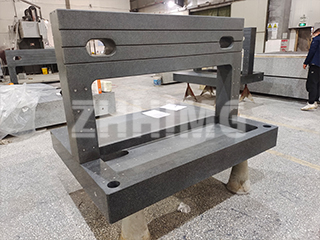In precision measurement applications involving granite surface plates, machine components, and measuring instruments, several technical factors can significantly influence measurement outcomes. Understanding these variables is essential for maintaining the exceptional accuracy that granite-based metrology equipment is known for.
The primary factor impacting measurement reliability stems from the inherent uncertainty of inspection instruments themselves. High-precision devices such as electronic levels, laser interferometers, digital micrometers, and advanced calipers all carry manufacturer-specified tolerances that contribute to the overall measurement uncertainty budget. Even premium-grade equipment requires regular calibration against recognized standards to maintain specified accuracy levels.
Environmental conditions present another major consideration. Granite’s relatively low thermal expansion coefficient (typically 5-6 μm/m·°C) doesn’t eliminate the need for temperature control. Workshop environments with thermal gradients exceeding ±1°C can induce measurable distortion in both the granite reference surface and the workpiece being measured. Industry best practices recommend maintaining a stable 20°C ±0.5°C measurement environment with proper equilibration time for all components.
Contamination control represents a frequently underestimated factor. Sub-micron particulate matter accumulating on measurement surfaces can create detectable errors, particularly when using optical flat or interferometric measurement methods. A Class 100 cleanroom environment is ideal for the most critical measurements, though controlled workshop conditions with proper cleaning protocols can suffice for many applications.
Operator technique introduces another layer of potential variation. Consistent measurement force application, proper probe selection, and standardized positioning methods must be rigorously maintained. This is especially crucial when measuring non-standard components that may require customized fixturing or specialized measurement approaches.
Implementation of comprehensive quality protocols can mitigate these challenges:
- Regular equipment calibration traceable to NIST or other recognized standards
- Thermal monitoring systems with real-time compensation
- Cleanroom-grade surface preparation procedures
- Operator certification programs with periodic requalification
- Measurement uncertainty analysis for critical applications
Our technical team provides:
• Granite component inspection services compliant with ISO 8512-2
• Custom measurement procedure development
• Environmental control consulting
• Operator training programs
For operations requiring the highest levels of measurement certainty, we recommend:
✓ Daily verification of master reference surfaces
✓ Triple-temperature calibration for critical instruments
✓ Automated data collection to minimize operator influence
✓ Periodic correlation studies between measurement systems
This technical approach ensures your granite-based measurement systems deliver consistent, reliable results meeting international standards for precision manufacturing and quality control applications. Contact our metrology specialists for customized solutions to your specific measurement challenges.
Post time: Jul-25-2025

